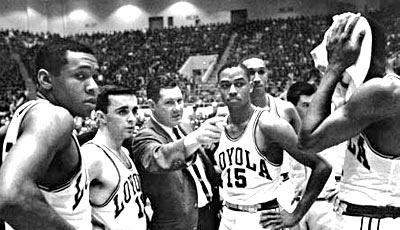NCAA News Archive - 2008
« back to 2008 | Back to NCAA News Archive Index
|
The NCAA News
The NCAA is staging a special screening of a documentary that chronicles the groundbreaking 1963 Division I men’s basketball Mideast regional semifinal between Loyola (Illinois) and Mississippi State.
The film about the role intercollegiate athletics played in social change is produced by Indianapolis-based Pathway Productions and will debut March 29 on the off-day of this year’s Midwest regional in Detroit. Several participants from both institutions will attend the event.
“At some point, you have to give the trailblazers credit for what they accomplished,” said NCAA Director of Broadcasting Greg Weitekamp. “We saw an opportunity to honor these two teams by telling the story and bringing them all together.”
The event itself was named one of the Top 25 Defining Moments in the first 100-year history of the NCAA in 2006.
The courageous decision by Mississippi State President Dean Colvard to allow the Southeastern Conference champion Bulldogs to compete in the NCAA tournament defied a court order that said the team couldn’t leave the state to compete against opponents that had African-Americans on the roster.
Loyola, the eventual national champion in 1963, started four black student-athletes, which broke all of the unwritten rules in the sport and the segregation policies that existed at that time.
Bulldogs coach Babe McCarthy, whose 1959, 1961 and 1962 teams weren’t allowed to play in the NCAA tournament, was driven away from campus under the cover of darkness to Nashville, Tennessee, and Colvard went to Alabama to avoid being served with the injunction.
The team was taken to the airport where it took a clandestine flight and picked up McCarthy along the way. The team arrived in East Lansing, Michigan, where it lost 61-51.
Loyola captain Jerry Harkness said the game was more important than winning the national championship that season, because the contest against Mississippi State helped pave the way for change in race relations in America.
The project of working on the documentary was a labor of love for producer Jerald Harkness, since his father Jerry played a key role.
“I savored every minute working on this,” said Jerald Harkness, who has worked on documentaries since 1992. “I knew it was a special story, and it has a special place in my heart. I’m sure I’ve approached this with an obsession to be thorough. It’s a story that should be known.”
Harkness said his father first approached him with the idea of making this story into a feature film. He later discovered plans to film “Glory Road,” which is the story of Texas Western’s all-black starting lineup defeating Kentucky’s all-white team for the 1966 NCAA title.
He talked with former NCAA Hall of Champions director George Smith, which led to another discussion with NCAA Vice President for Diversity and Inclusion Charlotte Westerhaus.
Pathway Productions began working on the film last October, and even though he had heard many aspects of the story from his father, Harkness still uncovered some hidden nuggets of information.
While shooting some archival footage in the Mississippi State campus, he was shown examples of correspondence Colvard received during the turbulent time.
“There was a box of negative letters, but there were at least five boxes with letters of approval for Colvard’s decision,” Harkness said. “It shows you that this one game allowed so many people to speak out about what they were feeling all along but were afraid to say. That was the most moving moment of the whole project.”
Two weeks ago, Harkness was told that an audio diary that Colvard kept during the time shows the kind of pressure he was under.
“He mentions having to take sleeping pills because of the danger he faced by sending the team to play in a basketball game. It is moving stuff,” Harkness said.
Negotiations are ongoing to find a distributor and possibly a network to show the almost hour-long documentary on television at some point in the future.

